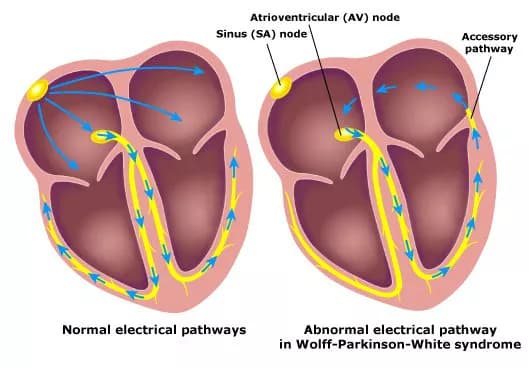
Wolff-Parkinson-White Syndrome
What are the other Names for this Condition? (Also known as/Synonyms)
- Preexcitation Syndrome
- WPW Syndrome
What is Wolff-Parkinson-White Syndrome? (Definition/Background Information)
- Wolff-Parkinson-White Syndrome (or WPW Syndrome) is a congenital condition that affects the heart. The condition arises due to a disruption in the process of how the message (signal that causes the heart to beat) gets passed within the heart
- As a result of this condition, the heart beats faster than normal, since the condition changes the normal physiology of the heart
- The heart is composed of three segments that make up the electrical system, which is how the information gets transferred. These segments include the sinoatrial node, atrioventricular node, and His Purkinje system
- The sinoatrial node is the most important segment of the 3, whose function is to initiate the signal
- The atrioventricular node allows the signal that is produced by the sinoatrial node to be distributed to the ventricles
- The His-Purkinje system distributes the signals throughout the ventricles making them to contract
- In Wolff-Parkinson-White Syndrome, an extra electrical pathway is present between the upper and lower chambers of heart causing the heart to beat rapidly
- WPW Syndrome is treated using medications and procedures to destroy the abnormal electrical pathways. In some cases, a surgery may be required
- The prognosis of the condition depends upon the severity of the condition. Overall, the prognosis of Wolff-Parkinson-White Syndrome is good with appropriate treatment and surgery (if required)
Who gets Wolff-Parkinson-White Syndrome? (Age and Sex Distribution)
- Wolff-Parkinson-White Syndrome is more likely to be seen in infants and children
- Both the female and male population may be affected
- There is no distinct racial, ethnic, or geographical predilection observed
What are the Risk Factors of Wolff-Parkinson-White Syndrome? (Predisposing Factors)
The risk factors associated with Wolff-Parkinson-White Syndrome include:
- Family history of the condition is a risk factor in some cases
- Presence of other heart-related ailments
- WPW Syndrome is known to be greatly associated with a specific heart condition called Ebstein's anomaly. In this anomaly, the tricuspid valve that is present on the right side of the heart does not function properly
It is important to note that having a risk factor does not mean that one will get the condition. A risk factor increases one's chances of getting a condition compared to an individual without the risk factors. Some risk factors are more important than others.
Also, not having a risk factor does not mean that an individual will not get the condition. It is always important to discuss the effect of risk factors with your healthcare provider.
What are the Causes of Wolff-Parkinson-White Syndrome? (Etiology)
- In Wolff-Parkinson-White Syndrome, an extra electrical pathway is present between the upper chambers (atria) and lower chambers (ventricles) that cause the heart to beat rapidly. This extra pathway is present since birth (congenital anomaly)
- In some cases, this pathway is caused by a genetic mutation (presence of abnormal gene), in the remaining cases, the cause of this pathway formation is not known
- Some forms of WPW Syndrome are believed to be inherited
What are the Signs and Symptoms of Wolff-Parkinson-White Syndrome?
The signs and symptoms associated with Wolff-Parkinson-White Syndrome include:
- Palpitations
- Chest pain
- Shortness of breath
- Dizziness, fainting
- Light-headedness
- Anxiety
How is Wolff-Parkinson-White Syndrome Diagnosed?
The diagnosis of Wolff-Parkinson-White Syndrome may be established through:
- A complete evaluation of medical history and thorough physical exam
- The physician will try to evaluate the heart sounds using a stethoscope
- Holter monitoring: It is 24-48 hours ambulatory ECG monitoring
Many clinical conditions may have similar signs and symptoms. Your healthcare provider may perform additional tests to rule out other clinical conditions to arrive at a definitive diagnosis.
What are the possible Complications of Wolff-Parkinson-White Syndrome?
The possible complications that are associated with Wolff-Parkinson-White Syndrome could include:
- Complication that may arise during a surgery
- Heart failure
- Abnormal heart rhythm can cause palpitations that may be emotionally stressful
- Sudden cardiac death
How is Wolff-Parkinson-White Syndrome Treated?
Wolff-Parkinson-White Syndrome treatment is based on the severity of the condition and how irregular the beats are present. It is also based on the underlying symptoms that are present with the condition.
- In cases where the individual does not appear to have any symptoms, he/she will be kept under observation and the physician may schedule to have regular follow-ups
- Anti-arrhythmic medications, such as procainamide and amiodarone are used to control rapid heartbeat
- Electrical cardioversion(shock), if medications cannot control the rapid heartbeat
- Catheter ablation: It is a long-term management of the syndrome, in which the extra pathway is destroyed using radiofrequency (special type of energy) or by freezing
- Open heart surgery may be performed to destroy the extra pathway
How can Wolff-Parkinson-White Syndrome be Prevented?
Currently, there are no known preventive measures for Wolff-Parkinson-White Syndrome.
What is the Prognosis of Wolff-Parkinson-White Syndrome? (Outcomes/Resolutions)
- The prognosis of Wolff-Parkinson-White Syndrome depends upon the severity of the condition
- In general, the prognosis of WPW Syndrome is good with appropriate treatment
Additional and Relevant Useful Information for Wolff-Parkinson-White Syndrome:
- The current studies that have been conducted, demonstrate that approximately 1-3 individuals per 1000 develop Wolff-Parkinson-White Syndrome
- WPW Syndrome is associated with Leber’s hereditary optic neuropathy, which is a type of mitochondrial disorder
Related Articles
Test Your Knowledge
Asked by users
Related Centers
Related Specialties
Related Physicians
Related Procedures
Related Resources
Join DoveHubs
and connect with fellow professionals

0 Comments
Please log in to post a comment.